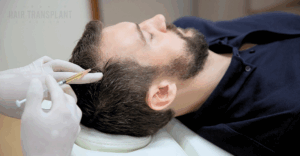How to Find the Best Doctors for Hair Loss – Toronto Hair Transplant Surgeons
Losing hair can significantly impact one’s self-esteem and overall well-being. It’s crucial to find a skilled and experienced doctor specializing in hair loss to address this concern effectively. This comprehensive guide is designed to equip you with the necessary knowledge and strategies to select the right dermatologist or hair loss specialist for your specific needs. It is especially important to choose a doctor with specialized training in diagnosing and treating hair loss to ensure you receive expert care.
By understanding the factors to consider, such as qualifications, experience, and patient reviews, you can make an informed decision to ensure you receive the best possible care and treatment for your hair loss concerns.
Understanding Hair Loss
Hair loss, or alopecia, is a widespread concern that affects both men and women of all ages. It can be distressing, but understanding the basics of hair loss is the first step toward effective treatment. Hair grows from tiny structures in the scalp called hair follicles, which go through cycles of growth, rest, and shedding. Disruptions in this cycle—whether from genetics, hormonal changes, or medical conditions—can lead to noticeable hair thinning or bald patches. Androgenetic alopecia, the most common form of hair loss, is influenced by genetics and hormones, making it essential to identify these factors for effective management.
There are several types of hair loss, including male pattern hair loss, female pattern hair loss, and alopecia areata. Male pattern and female pattern hair loss are often hereditary and linked to hormonal factors, while alopecia areata is an autoimmune condition that causes sudden, round bald patches. In some cases, damage to the hair follicles can result in permanent hair loss, making early diagnosis and intervention crucial. By understanding the underlying causes and types of hair loss, you and your doctor can work together to develop a personalized plan to support healthy hair growth and prevent further hair loss.
Causes and Diagnosis
Diagnosing hair loss begins with a comprehensive evaluation by a healthcare provider. This process typically includes a detailed medical history and a physical exam to assess the pattern and extent of hair loss. Your doctor may ask about your family history, recent illnesses, medications, and changes in your hair care routine. To pinpoint the cause, additional tests such as blood tests or a scalp biopsy may be recommended. Blood tests can help identify underlying medical conditions like thyroid disorders or iron deficiency, while a scalp biopsy can reveal issues such as scarring alopecia or autoimmune activity. In cases where hair loss is advanced, hair transplant surgery may be considered, which involves moving hair from a donor site to a bald area of the scalp.
The most common form of hair loss in men is male pattern hair loss, also known as androgenetic alopecia, while female pattern hair loss is the leading cause in women. Other types include alopecia areata, which causes patchy hair loss, telogen effluvium, which results in diffuse shedding, and traction alopecia, caused by repeated tension on the hair. Diagnostic tools like the pull test can help assess hair breakage and shedding, providing valuable information for diagnosing hair loss and guiding treatment decisions.
Hair Loss Conditions
Hair loss can present in various forms, each with its own set of characteristics and causes. Male pattern baldness typically starts with a receding hairline and thinning at the crown, eventually leading to more extensive hair loss. Female pattern baldness, on the other hand, usually manifests as diffuse thinning on the top of the scalp, while the hairline remains intact. Alopecia areata is an autoimmune disease that leads to sudden, round bald patches anywhere on the scalp or body.
Other types of hair loss include telogen effluvium, a temporary condition marked by excessive hair shedding often triggered by stress, illness, or hormonal changes. Traction alopecia results from constant pulling or tension on the hair follicles, commonly due to certain hairstyles. Medical conditions such as thyroid disease, iron deficiency, and other autoimmune disorders can also contribute to hair loss. Recognizing the specific type of hair loss is essential for selecting the most effective treatment and preventing further damage to the hair follicles.
Medical Evaluation
A thorough medical evaluation is a key step in addressing hair loss. During your visit, the doctor will conduct a physical exam to assess your scalp and hair, looking for signs of hair breakage, thinning, or scalp abnormalities. They may perform a pull test or tug test to evaluate the strength and shedding of your hair. Your medical history will be reviewed, including questions about your family history, hair care routine, and any underlying medical conditions that could be contributing to hair loss.
Diagnostic tests such as blood tests can help uncover issues like iron deficiency or thyroid problems, while a scalp biopsy may be performed to rule out scarring alopecia or other scalp disorders. In some cases, light microscopy is used to examine the hair shaft and follicles more closely. This comprehensive approach ensures that any underlying conditions are identified and addressed, paving the way for a targeted and effective treatment plan.
Key Factors to Consider When Choosing a Hair Loss Doctor
When it comes to hair loss treatment, the field of specialization plays a pivotal role. A hair doctor specialist typically focuses on the medical aspects of hair loss, offering treatments like medication or hormone therapy. Some of the other factors include:
- Choosing a doctor who carefully evaluates your individual risk factors for hair loss and potential treatment complications.
Credentials and Experience
Prioritize a hair loss doctor’s credentials and experience. Look for a board-certified medical professional with further training or specialization in hair loss conditions. Experience in diagnosing and treating hereditary hair loss is particularly valuable, as this common genetic condition often requires specialized approaches such as laser therapy or hair transplant surgery. Consider the doctor’s years of experience in treating cases similar to yours to ensure effective diagnosis and treatment of your hair loss whether through surgical or non-surgical methods.
Reputation and Reviews
Online reviews can provide valuable insights when researching a doctor’s reputation. Consider the doctor’s communication skills, bedside manner, and treatment outcomes. Seek recommendations from trusted sources like friends, family, or healthcare professionals.
Treatment Approach and Options
Different hair loss doctors may have different treatment approaches. Ask about their treatment philosophy and available therapies. Some doctors prioritize non-invasive treatments, while others specialize in surgical interventions. Choose a doctor whose approach aligns with your goals for managing hair loss. The approach should be a highly individualized plan.
It is important to select a doctor experienced in treating hair loss using a variety of methods, including those designed to treat hair loss with the goal to slow, stop, or even reverse hair loss, depending on your specific condition.
Cost and Insurance Coverage
Hair loss treatment costs vary depending on the type of treatment and the doctor’s expertise. Inquire about consultation, procedure, and additional expenses. Check if the doctor accepts insurance or offers financing options to make treatment affordable.
Accessibility and Location
Consider the convenience of the doctor’s location and accessibility when making your choice. Opting for a hair loss doctor with a conveniently located office can make it easier to attend appointments and adhere to treatment plans. Having diagnostic procedures, such as blood tests and scalp biopsies, performed in a dermatologist’s office also adds to the convenience and ensures a professional clinical setting. Additionally, inquire about the doctor’s availability for appointments and whether they offer flexible scheduling options to accommodate your needs.
Preparing for Your Appointment
Getting ready for your hair loss consultation can help you make the most of your time with your healthcare provider. Start by keeping a record of your hair loss, noting when it began, how much hair you’re losing, and any changes in your hair care routine. Write down any questions or concerns you have, such as the possible causes of your hair loss, available treatment options, and the risks and benefits of each approach.
Be prepared to discuss your family history, any medical conditions you have, and any medications or supplements you’re taking. Your healthcare provider may ask about your hair care habits and lifestyle factors that could be affecting your hair. Treatment options that may be discussed include oral medications, topical treatments, and surgical procedures like hair transplant surgery. By coming prepared, you’ll help your doctor diagnose your hair loss more accurately and recommend the most suitable treatment to restore your hair and confidence.
Technology and Treatment Options
Advancements in medical technology have introduced various effective treatments for hair loss. Ensure your chosen specialist is well-versed in the latest treatments and technologies. This could range from laser therapy and stem cell treatments to advanced hair transplantation techniques.
In addition to surgical options, there are over the counter treatments like minoxidil, which can help stimulate hair regrowth and slow hair loss. Platelet rich plasma (PRP) therapy is another innovative approach, using your own blood to promote tissue regeneration and encourage new hair growth. Medications such as Minoxidil and Finasteride are commonly used to treat pattern baldness, offering options for both men and women. These and other treatments aim to support the development of new hair, and ongoing assessment is important to monitor progress and effectiveness.
A frequently overlooked aspect is the level of comfort you feel with your doctor. Hair loss treatment can be a sensitive topic, and having a doctor who listens, empathizes, and communicates effectively can significantly impact your treatment experience.
Consider the location of the clinic. Regular visits might be necessary, so choosing a convenient doctor will make your treatment journey more manageable.
What to Expect and Questions to Ask Potential Hair Loss Doctors
Before your first appointment, prepare a list of your symptoms, medical history, and any treatments you’ve tried. This information will help the doctor understand your condition better. If you notice more hair falling out than usual or a receding hairline, consult your doctor promptly.
Key Questions to Ask
During your consultation with the hair loss doctor, it’s crucial to ask questions to gain clarity about your condition and the proposed treatment options. Be sure to ask about the differences in hair loss treatments for male and female patients, as certain medications and procedures may be tailored specifically to each. Some important questions to consider include:
What is the likely cause of my hair loss?
Understanding the underlying cause of your hair loss is essential for determining the most appropriate treatment approach. It’s important to discuss with your doctor whether hormonal imbalance or rapid hair loss could be contributing factors, as these can indicate underlying medical conditions that may require specific diagnostic tests and targeted treatments.
What treatment options do you recommend?
Discuss the various treatment options available, including both medical and surgical interventions, and their suitability for your specific condition. Some treatments work by stimulating hair production or restoring the normal hair growth cycle, which can be especially important for conditions that disrupt hair follicle health.
What are the potential side effects of these treatments?
Be informed about the potential side effects or risks associated with the recommended treatments to make an educated decision about your care.
Can you show me before-and-after photos of your patients?
Reviewing before-and-after photos of previous patients can provide insight into the doctor’s expertise and the potential outcomes of treatment.
What is the expected timeline for seeing results?
Understanding the expected timeline for seeing results from the chosen treatment plan can help manage expectations and gauge the effectiveness of the interventions. It is important to note that it can take at least three to six months of consistent treatment to observe noticeable improvements in hair growth or reduction in hair loss.
Understanding Treatment Plans
A reputable hair loss doctor should provide you with a clear and comprehensive treatment plan tailored to your individual needs. A comprehensive plan for treating hair loss should address both the underlying causes and the most effective therapies. This plan should outline the recommended course of action, including specific treatments, expected outcomes, and any follow-up procedures or appointments. It’s important to ensure that the treatment plan aligns with your goals, lifestyle, and preferences.
Cost and Insurance Considerations
Discuss the cost of the proposed treatment plan with the hair loss doctor and inquire about insurance coverage. Some treatments for hair loss may be considered cosmetic and may not be covered by insurance, so it’s crucial to have a clear understanding of the financial implications. Additionally, surgical procedures to treat hair loss, such as hair transplants, are often not covered by insurance, making it essential to explore potential financing options or payment plans to manage the cost of treatment.
Follow-up and Long-Term Care
After initiating treatment for hair loss, it’s vital to inquire about the follow-up care process and the level of support you can expect in the long term. Hair loss treatment often necessitates ongoing management and monitoring to track progress, adjust treatment plans as needed, and address any concerns that may arise. Follow-up visits may include monitoring the number of hair falls and assessing the health of the hair follicle.
Discuss with your hair loss doctor how frequently follow-up appointments will be scheduled and what kind of support and guidance will be provided between visits. This may include access to resources such as educational materials, support groups, or digital platforms where you can communicate with your healthcare provider.
Conclusion
Choosing the right doctor for addressing hair loss is a significant decision that requires thorough research, understanding, and trust. Remember, the best hair loss specialist is not only someone with the necessary expertise and experience but also someone who listens to your concerns, respects your preferences, and collaborates with you to achieve the best possible outcomes.
By taking the time to find a doctor who meets your needs and instills confidence, you can embark on your hair restoration journey with optimism and assurance. With the right doctor guiding you, you can navigate the challenges of hair loss with resilience and determination, knowing that you’re in capable hands.





